Satellites, drones, Artificial Intelligence, and big data are all now being used to drive increasing efficiency in industrial fishing. Campaigners are worried that fish don’t stand a chance
Satellites, drones, Artificial Intelligence, and big data are all now being used to drive increasing efficiency in industrial fishing. Campaigners are worried that fish don’t stand a chance
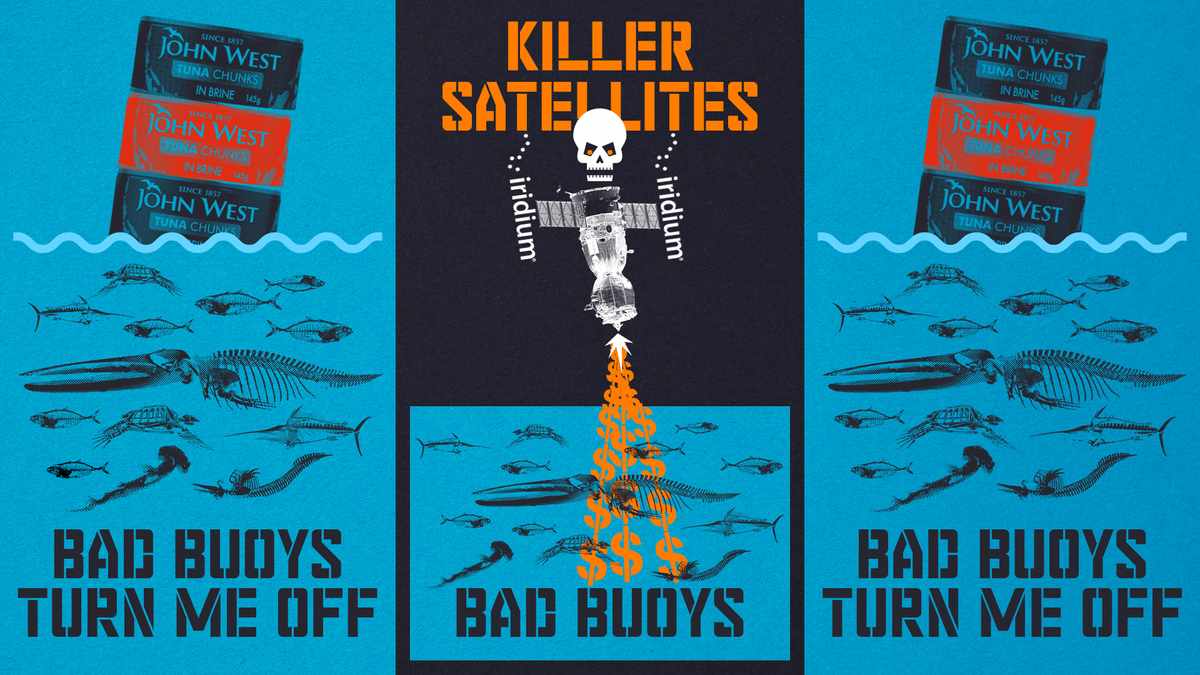
A Rebellion at Sea
At a Central London venue in February, a motley collective of artists, creatives, and activists met up to consider the state of the ocean, and what can be done to save it from an array of different threats.
A series of profoundly disturbing short talks were presented. What’s happening in our ocean today is devastating our atmosphere and the long-term survival of the extraordinary plants and animals that live there.
The collective is Ocean Rebellion. They create art, street theatre and interventions to raise awareness on the threats facing our ocean and put pressure on policy makers. Ocean Rebellion recently projected a slogan on a Lisbon landmark which sums up their cause:
“AS THE SEA DIES, WE DIE”.

Ocean Rebellion Projections - photo credit - Joao Daniel Pereira
The problem with ecocide on the high seas is that it happens ‘out of sight, out of mind’ for the public. Our planet is huge and two thirds of it is covered by the oceans. Once fishing fleets sail far from their home ports there is an irresistible temptation for them to engage in the unethical plundering of fish, a common resource which ought to be shared equitably by all.
We are now approaching a tipping point where certain fish populations have become so overfished that it will become impossible for them to rebound to healthy levels again. This is certainly the case for yellowfin tuna in the Indian Ocean, which is being plundered for cheap supermarket tuna.
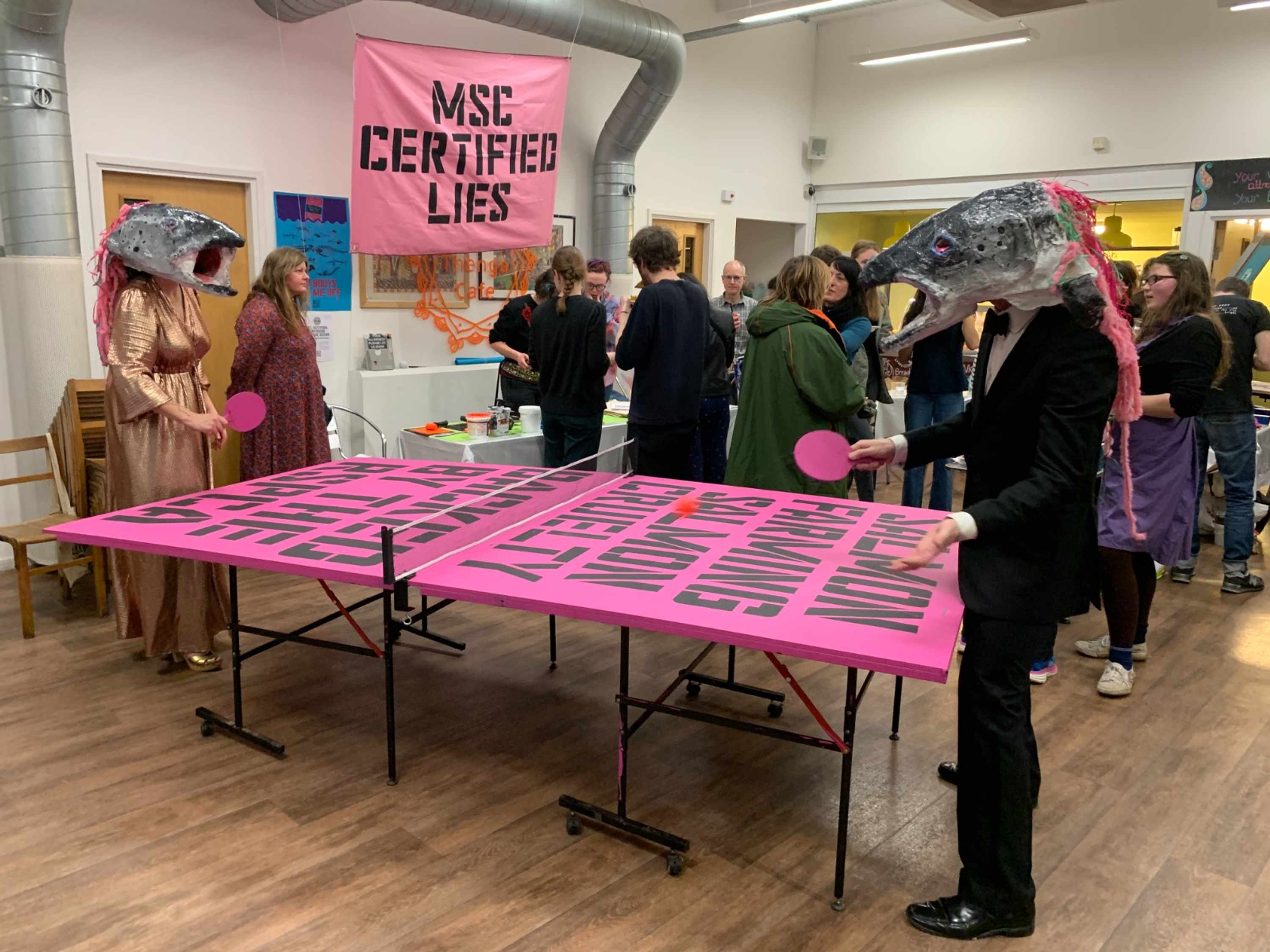
The Ocean Rebellion event in London - photo credit - Alex Hofford
Clive Russell, member of Ocean Rebellion said,
“The exploitation of the Ocean, whether that is industrial overfishing, mineral exploration and extraction or our ridiculous desire for evermore consumer goods, is driving marine ecosystems to the very brink of collapse. If we don’t join the dots between our own existence and the preservation and restoration of the Ocean, we, humanity as a whole, will be in big trouble. And the kind of trouble won’t be the kind that’s easily solved by some yet to be invented technology. The trouble we’ll be facing is the end of our own existence – extinction. We must face the truth, without a healthy and eco-rich Ocean there is no human life on Earth.”
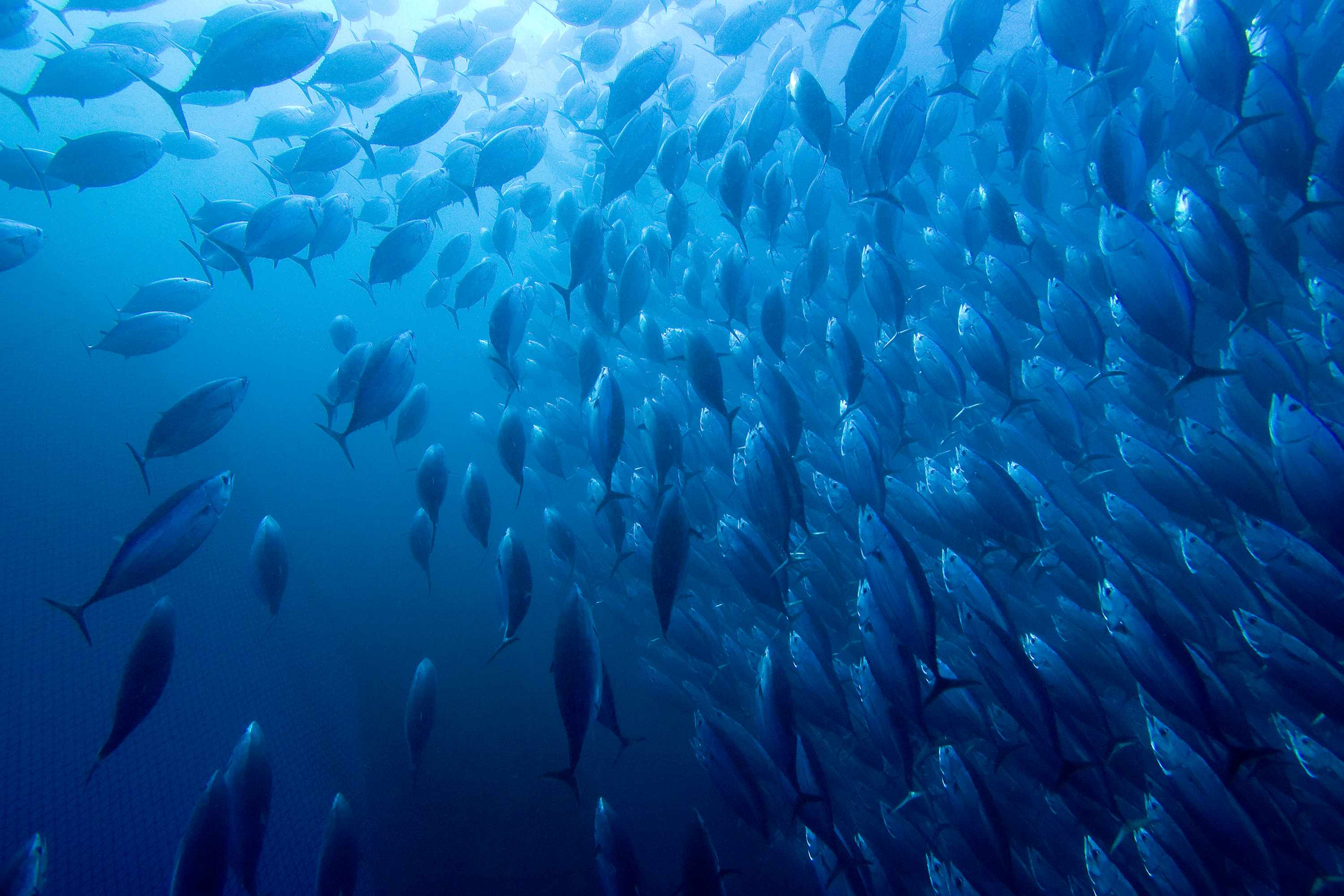
Tuna - photo credit - Alex Hofford
Ocean Planet
Planet Earth is a water world; less than thirty percent of its surface area is land. The oceans cover an area of 362 million square kilometres.
Life began in these oceans around four billion years ago. Since then, apart from five cataclysmic extinction level events, the diversity of life on the planet has been steadily increasing.
Planet Earth held its peak diversity and abundance of living organisms just before the start of the ‘Anthropocene’ period. Since the industrial revolution, the next mass extinction event has begun because of human activity.
Peak biodiversity in the oceans once meant great and wild cascades of incredible sea creatures, the stars of the BBC’s hit show ‘Blue Planet’. Before unconstrained mass resource extraction, the oceans once teemed with life.
It is hard for most people to imagine what vast shoals of fish, turtles, sharks, and whales might once have looked like. What scientists call the ‘shifting baseline syndrome’ describes the loss of perception of change that occurs when each generation redefines what is ‘natural’. Experts may evaluate the abundance of ocean dwelling organisms using only data from the outset of their careers.
Legend has it that sailors could once cross from their boats to the beaches of Caribbean islands by running across the backs of turtles. There were tens of millions of whales on earth before modern whaling began in the nineteenth century. Blue whale populations have been reduced by nearly ninety nine percent. It is estimated that ninety percent of large fish have been removed from the sea.
It is a fact that our ocean is now barren of life compared to the time before humans.

Shark entanglement - photo credit - Ifremer Mtaquet
Worse Things Happen at Sea
Since the 1950’s, the decimation of life in our ocean has been underpinned by oil. The industrialisation of the global fishing fleet has meant that fishing boats, once made of wood, can now be built out of steel. This has meant that they can go further and stay out at sea longer. Fishing fleets also use more efficient equipment such as extremely long and strong oil-based synthetic monofilament fibre fishing lines and purse seine fishing nets.
Unfortunately, poor regulations mean that most boats still burn the dirtiest oil: heavy fuel oil. This releases toxic pollution and carbon dioxide into the atmosphere, which is absorbed into the oceans causing ocean acidification.
All kinds of marine traffic dump waste overboard in contravention of marine pollution regulations. Slavery and labour rights abuses are also a major problem at sea, where isolated fishermen and fishery observers can be deprived of their basic human rights and may even end up dead whilst performing their duties.
Professor Chris Armstrong of the University of Southampton said,
"Industrial fishing is the site of some of the worst labour abuses in the world. Many miles from shore and unable to contact friends and family, fishermen are hugely vulnerable. Unfortunately, some skippers exploit that vulnerability to mistreat workers, denying them fair pay and access to even the most basic health care. Complaining about their predicament can, in the worst cases, end in beatings and even murder."
The worst impacts occur when industrial might is directed to extract the maximum possible amount of living creatures out of the mysterious depths. Historically, overfishing has led to the collapse of ecosystems and has pushed many marine species to the brink of extinction.
Life in the oceans can still be saved. Besides reining in overfishing, what’s required are more Marine Protected Areas in which marine life can flourish, but these also need to be strictly enforced.
Despite various international efforts to prevent ecosystem collapse and extinction, overfishing is rife and extremely harmful fishing practices remain. The most egregious types of indiscriminate fishing gear are; Bottom Trawling, Gill Nets, Longlining and Drifting Fish Aggregating Devices. ‘Out of sight, out of mind’ means that it is unimaginable that equivalent techniques would ever be deployed to hunt wild animals on land.

An isolated fishing vessel
Bottom Trawling
This fishing gear hauls out of the water all creatures that live on or just above the seabed. To better understand how destructive bottom trawling works, one should visualise a helicopter dragging a giant net across meadows or jungle, scooping up entire herds of sheep, cows, or orang-utans.
The disruption from bottom trawling is so great that a recent study found the carbon emissions from bottom trawling to be even greater than aviation. Dolphin strandings along England’s south coast are often caused by Dutch so-called ‘supertrawlers’ engaged in bottom trawling in the English Channel. The Sussex Dolphin Project is helping to raise awareness to combat this.
Gill Nets
Gill nets are ruthlessly effective and cruel. These nets are long and thin, often set between two anchored points marked by buoys and flags. Because these submerged nets are then left unmonitored, marine life such as dolphins, sharks and turtles may suffer for days. Many bleed to death before the boat returns to remove them from the ocean. Marine wildlife that makes it to the deck alive are ripped out of the net by hand and suffocate or are cut open while still alive. Gill nets are a real problem and are used in places as diverse as Iran and until recently, California, where they are now banned.
Longlining
Fishing boats deploy hundreds of kilometres of tough plastic monofilament fibre with bait lines with wire leaders tipped with hooks every fifty metres. Ostensibly for catching tuna, long liners also catch large numbers of sharks, turtles, sea birds and billfish. Longlining has long been associated with human rights abuses, especially with the Taiwanese distant water fishing fleet that supplies tuna to Thai Union, parent group of John West.
Drifting Fish Aggregating Devices
These indiscriminate killing machines are essentially floating islands of debris, such as old fishing nets and ropes, that drift on the ocean current attracting a mini ecosystem of sea creatures into their shade in the wide-open ocean.
Communication devices are tethered to dFADs to communicate their location via satellite to the fishing fleets who return after several weeks and extract tuna using purse seine nets. But they also catch endangered and threatened so-called “bycatch” species such as; juvenile yellowfin tuna, sharks, turtles and cetaceans.
Ninety percent of drifting FADs are also lost or discarded at sea. This represents a serious and particularly harmful source of plastic and electronic waste pollution.
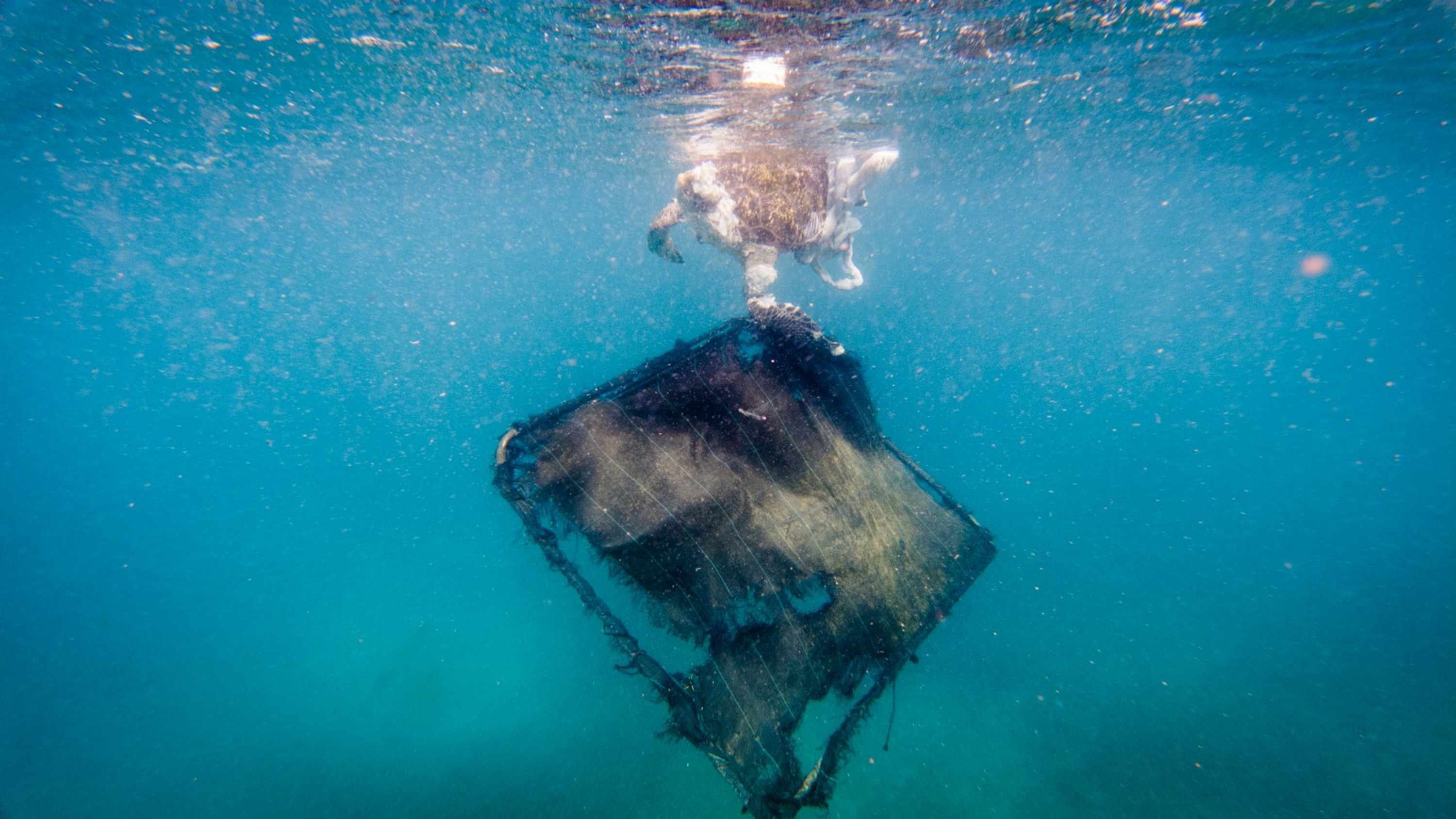
A turtle trapped in part of a drifting FAD - photo credit - Francesca Tillman - Save Our Seas Foundation
Emilia Dyer, a researcher at the University of Exeter said,
“Drifting FADs are a multi-layered issue which have serious impacts beyond the tuna stocks that they target. They are disrupting the natural balance of the entire ocean ecosystem which has consequences for us all. Industrial purse seine dFAD fisheries have slipped under the radar for too long whilst driving overfishing of tuna stocks, bycatch of other vulnerable species, and vast pollution in our oceans. When their operations are having such concerning global impacts, it is not good enough that the information of their actions be considered an industry secret. It is vital that this industry is held accountable for the damage that have had over the last four decades, and will continue to have until they are effectively, transparently, and fairly managed.”
Alex Hofford a marine wildlife campaigner with UK charity Shark Guardian, said,
“There are regulations on drifting FADs but unfortunately, they are not enforced very well. Fishing companies say the so-called 'bycatch' of sharks, whales and turtles is accidental. But there’s no police out there in the ocean, and they make the authorities simply take their word for it. Enforcement relies heavily on the fishing companies to self-report. It’s done on trust. And sometimes fisheries observers put on board fishing vessels to make sure that fishing proceeds according to the rules are bribed or coerced to look the other way. It’s a shady business. There have even been cases where fisheries observers have been murdered. In February last year, India put forth a proposal at the United Nations Indian Ocean Tuna Commission (IOTC) to ban drifting FADs. Indonesia also put forth a proposal, not to ban, but just to impose stricter measures on these awful devices, but both failed because of the shady behind the scenes actions of the European Union which is under the heavy influence of Spanish and French commercial fisheries. So, because of strong lobbying, these things are hard to ban, or even just regulate to the extent that endangered species decline can be halted. Coastal member states of the IOTC are heavily influenced by the prospect of European development aid being suspended if they vote the wrong way, if you know what I mean. This also happened with Japan using this 'carrot and stick' approach at the International Whaling Commission, it has been well documented by the NGOs. A school here, a clinic there, but only if you vote the right way. In this case, torpedo any attempts to ban or strictly regulate drifting dFADs.”
The Role of Satellites in Drifting FAD Overfishing
Along with a coalition of marine conservation and animal welfare groups, scientists, campaigners, lawmakers and celebrities, Ocean Rebellion have been jointly calling on satellite owner Iridium to stop satellite-assisted slaughter in the oceans.
Iridium ‘Short Burst Devices’ found inside floating buoys attached to drifting Fish Aggregating Devices enable their location to be shared through their Low-Earth-Orbit network with fishing fleets. In this way, it can be argued that Iridium is enabling overfishing.
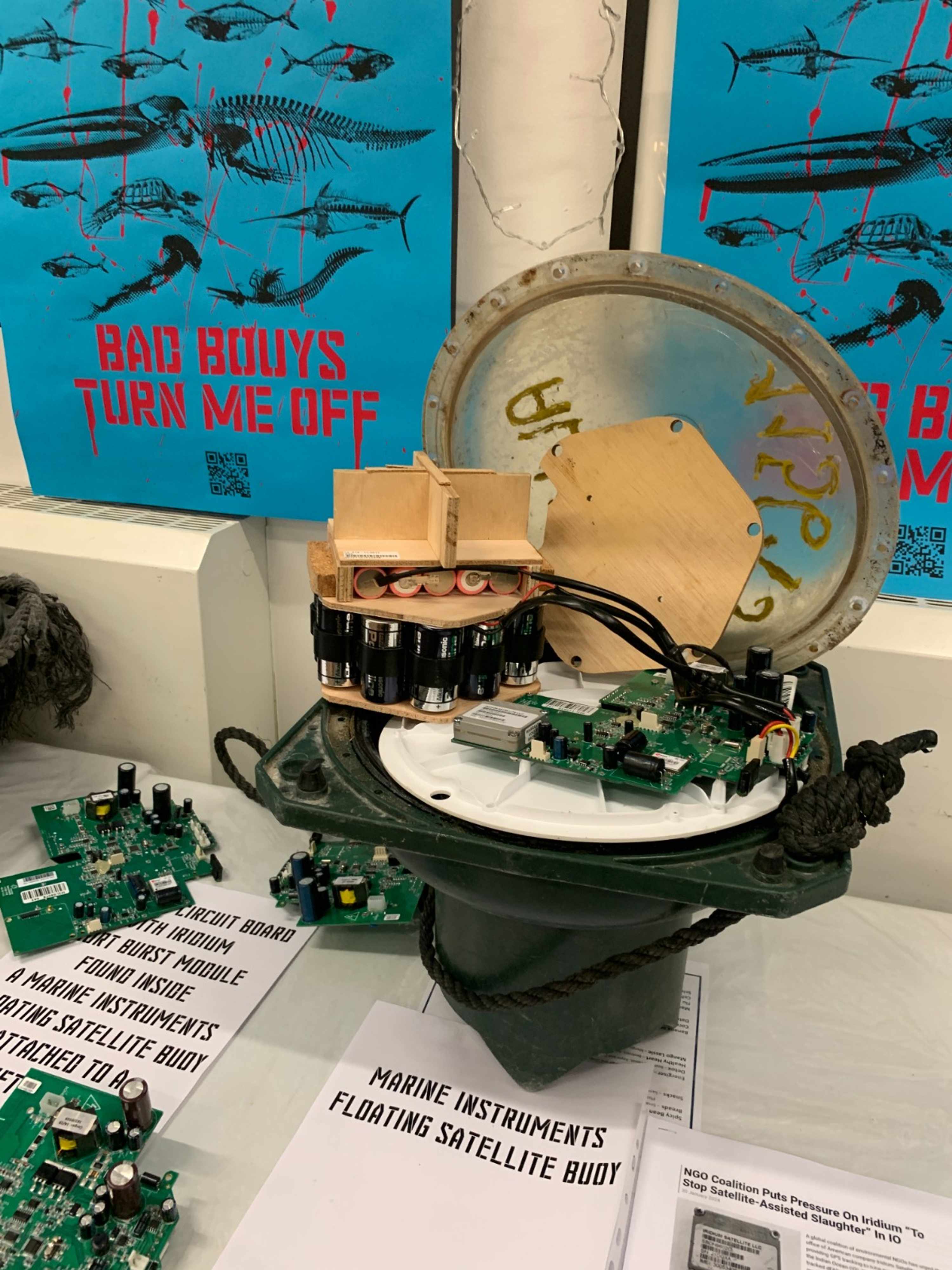
An Iridium-enabled Marine Instruments floating satellite buoy used in the industrial overfishing of tuna - photo credit - Alex Hofford
Chris Packham, Wildlife TV Presenter, Conservationist and Campaigner, said,
"There is something both sad and sinister about the invention and deployment of these dystopian devices. Sad because they seriously exacerbate the rate of decline of increasingly rare fish populations, and sinister because they drift unseen in distant seas on the pretext of offering shelter and respite to marine life. In fact, they are insidious traps set by a greedy unsustainable industry hell bent on maximising profits over any protection of these ecosystems. It's all very Skynet, in both the Sci-Fi and real sense. And ironic that it's facilitated by a company that prides itself on saving and protecting lives. Iridium doesn’t need this, the oceans don’t need this, and tuna, sharks, dolphins and turtles don’t need it either."
https://youtu.be/CmvnFwek8xc?si=NbTzNPfeAcj8i4Fn
Alex Hofford, a marine wildlife campaigner with UK charity Shark Guardian, said,
"Perhaps due to a lack of awareness, Iridium has been an unwitting accomplice in unsustainable overfishing for many years. Unfortunately, fragile ecosystems have been destroyed by European tuna fishing boats that rely on Iridium technology to engage in sustained plundering of marine resources. As it currently stands, Iridium instruments are being used unethically to push some marine species to the brink of extinction, and this should stop.”
What can we do about it?
In UK supermarkets, much of the cheap tuna sold is from the most harmful means of extraction - FAD caught.
Ocean Rebellion, working in partnership with other NGOs, campaigners and Ecohustler are launching a campaign to have FAD caught tuna removed from supermarket shelves. This is a small but highly targeted step that would have an immediate positive impact on marine ecosystems. We also want Iridium to stop enabling FADs with their technology.
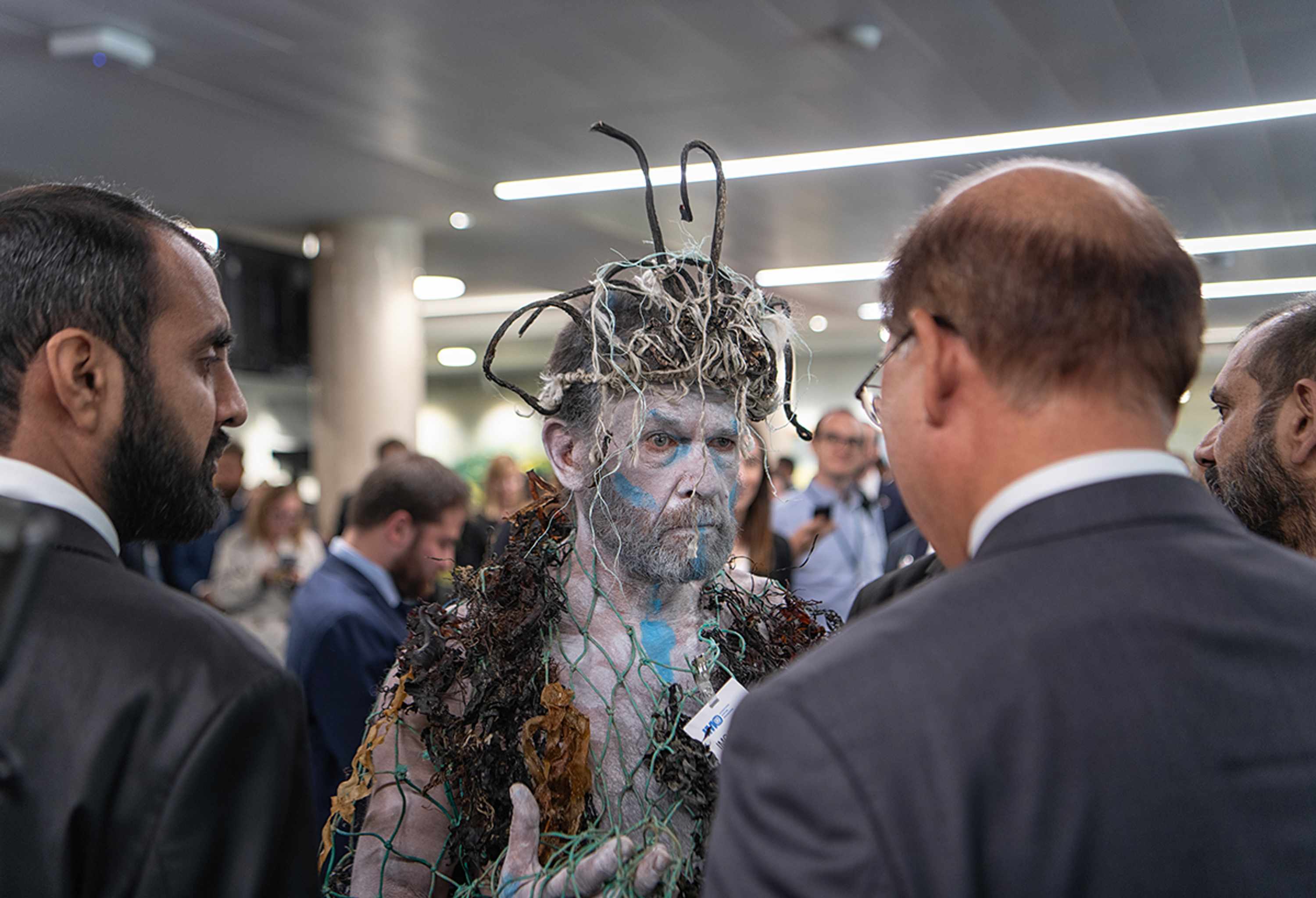
Ocean Rebellion attend an UN International Maritime Organisation meeting - photo credit - Guy Reece
Clive Russell, a member of Ocean Rebellion said,
“Change will only happen when we, as citizens of the Earth, understand that we have the power to demand change. And when we act together this power is multiplied many times over. In the words of the late great David Graeber “the ultimate hidden truth of the world is that it is something that we make and could just as easily make differently.” It’s up to us all to collectively imagine how we can make this world, this ocean, better for all life - and act on it.”
If you want to find out more or get involved check out Ocean Rebellion, sign up to the Ecohustler newsletter or email Matt. New actions coming soon!

Ocean Rebellion Fish - photo credit - Joao Daniel Pereira


